Love Welcomes
At the Love Welcomes workshop, in a refugee camp outside Athens, Syrian women learn to weave on a simple loom. The recycled yarn and thread they use comes from life vests and blankets discarded by exhausted refugees as they disembark from boats. The throws, cushions and doormats they produce are sold online. “We support women who are waiting to have their papers and visas processed; it can be a hopeless, desperate time,” says Love Welcomes co-founder Abi Hewitt. “Our aim is to give people a reason to wake up in the morning and feel they’re contributing to society.”
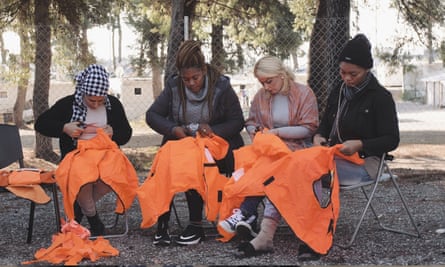
The social enterprise was set up as a partnership between the refugee women, Hewitt (who has a background in international development) and Becca Stevens, who opened a women’s refuge in the US in 2017. This last year has seen the business really expand. Artist Banksy created a new doormat design for the charity which sells for £500 a piece; it currently has a waiting list.
Profits from Banksy’s design have enabled Hewitt to expand the workforce from nine to 40 women. All are paid a fair wage. For Hewitt, it’s important that the products, which are sold online and at markets across the world, have a strong commercial appeal. Last year, she invited British textile artist Margo Selby to oversee production of a new range in a jaunty blue-and-white weave. “The women in my family have always made textiles and I’ve been involved in weaving all my life,” says Selby. “It’s been wonderful to work on something that has human value to it.”
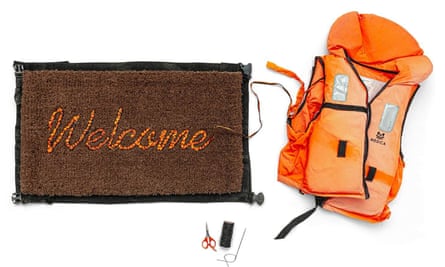
The enterprise has had a ripple effect, kickstarting a micro economy in the camp. Profits fund buses into Athens, where camp residents can shop for clothes and supplies. “It has enabled others to start businesses in the camp, including a restaurant and coffee bar. All this makes their lives 1% better.”
The business model has proved so successful that Hewitt has been asked to open workshops in 14 other camps. She is cautiously optimistic. “Our aim is to open in more, but slowly. First, it’s important that we can guarantee sales.”
Lovewelcomes.org
Aerende
In 2015, Emily Mathieson was at a craft fair when a wicker basket caught her eye. She discovered that it had been woven by people with learning disabilities. And that only one had sold that day. Mathieson, a former journalist, was looking for a business idea combining her interests in interiors and ethical design, and this felt like a catalyst.
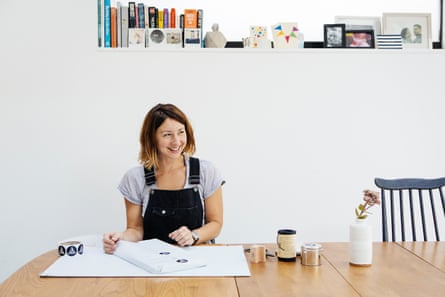
With a crowdfunded campaign and support from a local enterprise agency, Mathieson founded Aerende (from the Old English word meaning “care”), an online shop selling homewares and gifts handmade in the UK by people facing barriers to employment. “Every element of the business has been chosen to benefit makers as much as to delight consumers,” says Mathieson. Aerende was voted Homeware Brand of the Year at the inaugural Sustainable Lifestyle Awards in 2019.
Mathieson’s homewares are produced by makers supported by charities across the UK. From Studio 306, a programme for people recovering from mental health issues, she sourced candlesticks and brass dishes. There is bed linen and lampshades from FabricWorks, a social enterprise for marginalised women, and pottery made by people with learning difficulties.
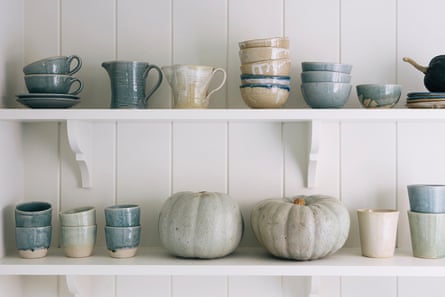
Mathieson spends time with makers refining designs before bringing the goods to market. “It’s a collaborative approach. I’ll work with a group, sharing ideas on sizes or colours, until we get a design that’s commercially replicable, and therapeutic.”
Artist and illustrator Rob Mackenzie, who is recovering from a brain haemorrhage, works with Aerende. “The work has given him a deeper sense of purpose,” says Mackenzie’s partner Syreeta Challinger. “I help with art direction and producing the screen-prints. It’s improved our self-esteem to find that people want to buy Rob’s art.”
“Obviously it’s been a weird six months with lockdown,” says Mathieson, “but our consumer sales are up over 100%. It’s been a struggle keeping things in stock as workshops have had to close and many of our makers remain very vulnerable.”
Candle and soap-making is compatible with home working. “And given the extra hand-washing, it’s nice for people to have something gentle to use on their hands. We also have masks coming – handmade, using organic elastic and linen overcuts from our duvet covers.”
Aerende recently stopped working with a major high-street brand over its response to Black Lives Matter. “It was tough to turn down, but when I started I wanted to act as a benchmark for good business. I’m a great believer that spending money is a vote for the kind of world you want to live in. Business can be a great driving force behind social change.”
Aerende.co.uk
Mending for Good
At the launch of author Julie Summers’ biography of Audrey Withers, UK Vogue editor during the second world war, guests were given a keepsake of which Withers would have approved. A ribbon embellished with “make do and mend” or “fashion on the ration”, in intricate embroidery. The ribbons were donated by luxury brands and embroidered by prison inmates for Mending for Good, a consultancy which turns fashion houses’ dead stock into commercially appealing clothes and accessories made by artisans from challenged backgrounds.
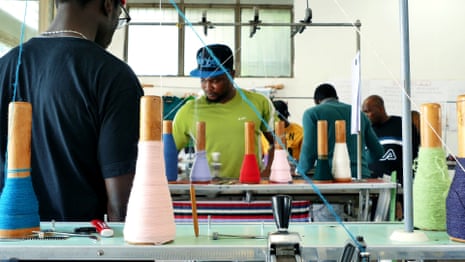
Mending for Good’s Saskia Terzani used to work for Victoria Beckham. Co-founder Barbara Guarducci, a designer and creative who’s also worked at the UN, develops textiles with prison inmates, refugees and recovering addicts. “We wanted to combine our skills and backgrounds to deliver positive social impact,” says Terzani. “Our aim is to get brands used to the idea of repurposing through craft projects. It’s early days, but attitudes are changing. Just a few years, ago fast fashion – buying that latest T-shirt – had kudos. Now people show a concern for the way things are produced.”
For example, Guarducci works with recovering addicts at a rehabilitation clinic in northern Italy, where artisans produce fabrics and accessories using recycled materials for fashion labels such as Brunello Cucinelli and the Zegna Group. Last year, Salvatore Ferragamo commissioned a vibrant wall hanging, woven from left-over textiles and leather, for a show about sustainable design at the company’s Florence HQ.
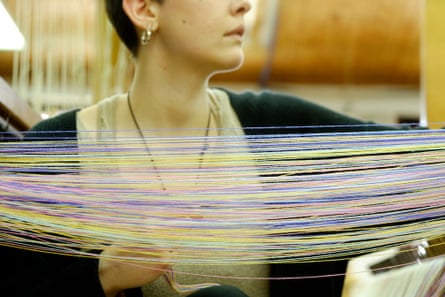
“We launched right before Covid exploded,” says Guarducci. “All conversations suddenly stopped. But what I can tell you is that, after lockdown lifted, brands seem to be more open to discuss excess stock with us – you can imagine how much they have by now – and circular ideas using socially valuable craft projects.”
A collaboration with the London College of Fashion to open a Mending for Good pilot embroidery department offering training to women from the local Bangladeshi community has had to be put on hold during the pandemic, but Mending for Good is determined to persevere. “Through the discipline of craft, people can find dignity, but it’s equally important that they can make a living from it.”
Mendingforgood.org
MADE51
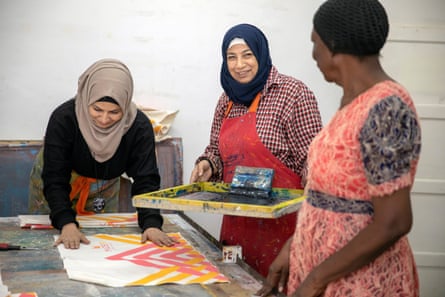
Lampshades woven from leather and cotton by Malian refugees in Burkina Faso, crocheted toys made by Syrian refugees in Turkey, and delicate jewellery by artisans who fled persecution in Myanmar to settle in Malaysia… All these bright, colourful wares crowd the pages of Made51’s colourful catalogue.
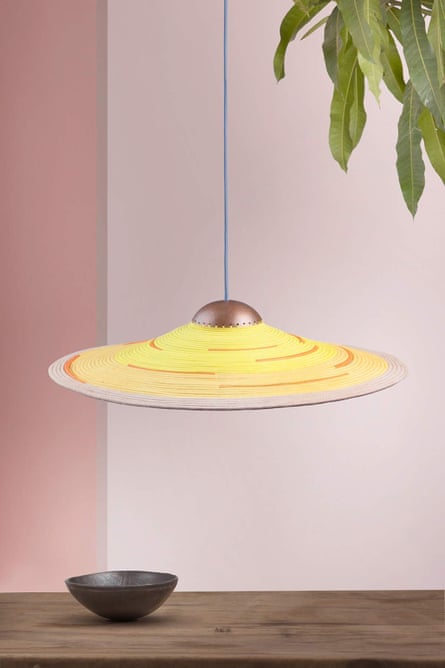
Based in Geneva, Made51 was set up by the UN’s refugee agency UNHCR to connect makers with social enterprises working in the craft sector. “You’ll often find small collectives in refugee camps, but most of them lack the raw materials, or right guidance about design or production, to earn a decent wage. This is where we can help,” explains global manager Heidi Christ. Made51 currently partners with 22 social enterprises working with refugees living in 15 hosting countries. The social enterprises pay refugees a fair wage and ensure they work in decent conditions. The designs are sold through the websites of the social enterprises and Made51’s online shop, which launched this year.
There are other social benefits too. Finding gainful employment also helps refugees to integrate with local communities, says Christ. In Cairo, for instance, a group of female refugees who escaped persecution in Syria, Sudan and Somalia, have joined a collective of local women on low incomes, to form Nilfurat, producing handwoven textiles and homewares. “Even in urban settings, refugees can feel really isolated and lack the opportunities to earn income,” says Christ. “Enabling them to do something that allows them to participate in a global market, where their products reach customers, is life-changing.”
made51.org
Lél
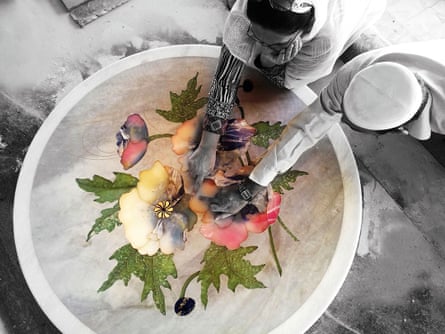
Lél’s founder, Farhana Asad, became fascinated by the technique of inlaid stonework known as parchin kari or pietra dura when she came across an exquisite box in a bazaar in northern Pakistan 25 years ago. She eventually tracked down its maker, an Afghani craftsman who was living nearby, who agreed to give her lessons in the technique in her garage at home. Ever since, the Lél artist collective that Asad founded has opened its doors to artisans escaping the war across the border and worked to preserve the craft’s knowledge and skills for future generations, as well as exploring the creative possibilities of the technique.
Production has continued at Lél’s Peshawar base, even during the height of the Taliban insurgency in the early 2000s when bomb blasts rattled the studio windows. “All of us lost a friend or relative at that time. But the work became a way of pushing back, changing the narrative. To conserve an ancient art in violent times is a therapeutic experience,” says Farhana’s daughter Meherunnisa, an architect and graduate of New York’s Pratt Institute, who now works alongside her mother as Lél’s creative director.
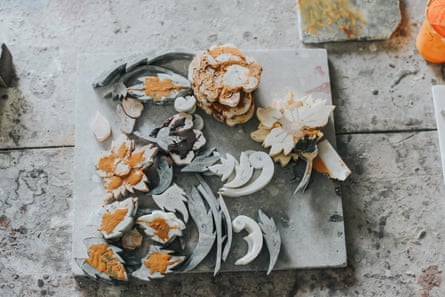
The studio employs 20 artisans, including Pashtun locals, who collaborate with wood and metalworkers. Their work – furniture, wall panels, jewellery – fuses modern shapes with Mughal-inspired patterns or geometric designs, in lapis lazuli or jade. Lél’s work has appeared at international trade fairs, leading to collaborations with designers and architects across the world. Baryalai Noorzai, a Peshwari local who works for Lél, says his employment has changed his life. “I was very poor and lived in a mud house, but now I’ve been able to buy my own land and make a cement house for my family.”
The Lél workshop had been working on a parchin kari marble floor for the Pakistan Pavilion at the London Design Biennale, but with the event postponed until 2021 due to the pandemic, the focus now is on opening an online shop and a homeware range – which will be launched in September. For Lél’s artisans, says Meherunnisa, every piece they make is a reminder of home: “The project goes beyond the security of employment – it’s a craft rooted in the familiar: the mountains, the heart of stone. It’s a connection with a shared history and culture, which they can hold on to.”
http://www.studio-lel.com